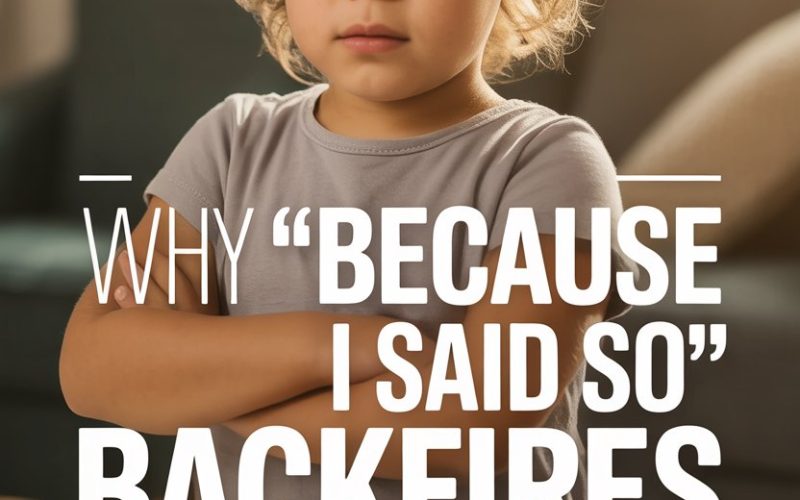Ah, the classic phrase uttered from time immemorial by tired, loving, and occasionally exasperated parents everywhere: “Because I said so.”
Sometimes it slips out when you’re running on four hours’ sleep, three cups of coffee, and approximately two shreds of patience.
But while it may feel efficient—like parenting in hard mode—it can cause more headaches than harmony.
Here’s why this old chestnut rarely gets the job done, and what works better when you’d rather wrestle a hedgehog than explain your reasoning one more time.
Kids Aren’t Robots (Most Days)
Children aren’t machines you can program with commands and expect instant compliance. Even the tiniest toddler has a mind fizzing with curiosity and a will to match.
No matter how much you wish “Because I said so” had magical mind-control properties, kids are hardwired to want to know why.
When met with a flat, “Because I said so,” all that questioning energy doesn’t dissolve. It usually doubles down—sometimes with added volume.
Dr. Justin Coulson, a parenting researcher, found that children who feel their questions are brushed aside are more likely to push back—not less.
Instead of snuffing out the endless “whys,” this phrase can spark bigger power struggles.
It’s a Trust Buster
Little humans are learning, moment by moment, who they can rely on. When parents offer a blanket refusal without explanation, kids might feel dismissed or ignored.
That’s not exactly a recipe for warm fuzzies—or for future conversations about the bigger stuff (think: dating, driving, or explaining that mysterious rash at 16).
Research from the University of New Hampshire found that kids who grow up with authoritative communication—think clear boundaries, but with dialogue—are more likely to trust their parents and less likely to rebel dramatically.
“Because I said so” often lands somewhere between a power play and a verbal door slam. That door can be tough to pry open again when it really counts.
It’s a Motivation Killer
Ever tried following a rule that makes no sense to you? It’s about as inspiring as a soggy biscuit.
Children are no different. If they don’t understand why they need to eat their veggies or tidy up their toys, compliance turns into a reluctant trudge—or a full-on mutiny.
Parenting experts like Dr. Laura Markham suggest that when kids get reasons for rules—like “brushing teeth keeps the sugar bugs away”—they’re more likely to cooperate willingly. G
ive them a smidge of logic, and you might actually see those trainers in the shoe rack instead of under the sofa (for once).
It Doesn’t Teach Decision-Making
One of the sneakiest perks of parenting? Getting to raise future adults who know how to think for themselves. “Because I said so” doesn’t offer much brain food for critical thinking.
Kids who hear explanations learn how to weigh options, consider consequences, and eventually make solid choices without constant supervision.
That’s the gold standard, right? You can’t stand over them forever (unless you fancy becoming a very tired, unpaid security guard).
As psychologist Dr. Ross Greene puts it, “Kids do well if they can.” Our job is to teach them how.
You’ll Pay for It Later
Shortcuts are tempting—especially at the end of a monster day. Trouble is, the “Because I said so” shortcut comes with potholes later down the road.
Children who aren’t used to hearing explanations may struggle with authority figures outside the home, from teachers to sports coaches. Or worse, they’ll do what they’re told without question, even if it doesn’t feel right.
That’s not the kind of compliance anyone wants.
Experts warn that overusing this phrase can stunt kids’ confidence to speak up, problem-solve, and—eventually—stand their ground if someone crosses a line.
It Can Damage Your Relationship (Yes, Even Over Bedtime)
Years from now, your child likely won’t remember every spat over pyjamas or peas. What sticks is how you made them feel when things got tense.
“Because I said so” can send a quick message: “Your thoughts don’t matter.” Ouch.
When kids feel heard—even if they don’t get their way—they’re less likely to resent the rules and more likely to come back to you with bigger problems.
That’s worth its weight in gold, especially when the stakes are higher than broccoli.
The Alternatives: What Works Instead
Fair warning: explaining yourself every time can feel exhausting. But there’s good news. You don’t need to become a TED Talk on tap.
A short, clear reason works wonders: “We’re leaving the park now so we can have dinner and not be late for bedtime.”
If you feel like you’re about to unravel, it’s fine to keep it brief—just avoid the temptation to go full Supreme Court Justice.
When possible, offer choices: “Would you like to brush your teeth before or after putting on pyjamas?” Suddenly, you’re not the dictator in the room. You’re the benevolent guide, offering options within safe boundaries.
And on those days when you just can’t explain (hello, nappy explosion), it’s okay to say, “I can’t explain right now, but I will later.”
Kids learn that sometimes grown-up decisions need to happen quickly, but that doesn’t mean their questions are unwelcome.
Empathy Goes a Long Way
Even if you can’t say yes, acknowledging a child’s feelings can turn a meltdown into a manageable moment. Try, “I know you’re upset we’re leaving the playground. It’s so hard to stop playing when you’re having fun.”
Children who feel seen are more likely to go along, even if they grumble a bit. (And frankly, who among us doesn’t grumble at the occasional early meeting or burnt toast?)
Consistency, Not Rigidity, Wins the Day
Flexibility is a muscle worth flexing. When rules always come down like a hammer, kids either become sneaky or shut down.
Showing that you’re willing to listen—even if the answer is still no—teaches negotiation, compromise, and that grown-ups are human too.
Australian psychologist Steve Biddulph points out that children thrive with consistent, loving boundaries, but those work best when set with kindness rather than a barked command.
When You’re at the End of Your Tether
There will be days when you’re so knackered you can barely string a sentence together. Every parent has reached for the “Because I said so” ejector seat (guilty as charged).
If it slips out, forgive yourself—then try to circle back when you’ve recovered.
A quick, “I was really tired before, but here’s why I asked you to…” can patch things up faster than you’d expect.
Kids are forgiving, especially when they see you owning your slip-ups. (And they’ll remind you for the next decade, just for fun.)
Building a Home Where Questions Are Welcome
The aim isn’t to turn every request into a philosophical debate. That way madness lies—and you’ll never get out of the house on time.
Instead, aim for a family culture where questions are welcome, and explanations are the norm. Kids are more likely to respect boundaries when they feel respected in return.
You might even see some surprising benefits: fewer tantrums, more cooperation, and (occasionally) a child who volunteers to clear the table without being asked. Stranger things have happened.
Finding Your Parenting Voice—Without the Megaphone
Many parents fear that giving reasons will turn them into pushovers. Not so. Setting limits with respect and explanation doesn’t water down your authority; it strengthens it.
Remember, your child isn’t angling for a loophole every time they ask “why.” Often, they’re just trying to make sense of their world.
Giving them a peek into your thinking helps them learn how to make good choices on their own.
And isn’t that the whole point?
The Long Game
Raising children who understand boundaries and respect rules—without fear or resentment—takes a little extra effort now, but pays dividends later. Ditching “Because I said so” doesn’t mean you’re caving in.
It means you’re investing in a stronger relationship, a more reasonable household, and a child who’s ready to face the world with a healthy dose of curiosity and confidence.
When all else fails, take a deep breath, look your little negotiator in the eye, and give them a reason—however brief.
It might not silence every protest, but you’ll have planted something powerful: the idea that their questions matter, and that Mum, Dad, or whoever’s steering the ship is worth listening to.
And hey, if you do find yourself blurting out “Because I said so” at 7:45pm on a Tuesday, don’t sweat it.
There’s always tomorrow, another cuppa, and a fresh start.




